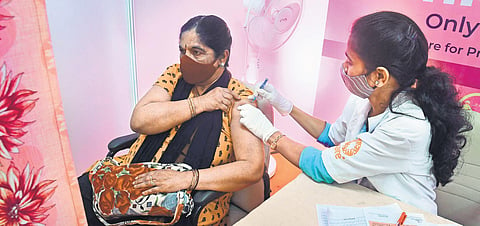

BENGALURU: Researchers from the Indian Institute of Science (IISc) and Queensland Brain Institute (QBI) in Australia have developed a mathematical model to predict how antibodies generated by Covid-19 vaccines offer protection against symptomatic infections. This model aims at finding optimal use of available Covid-19 vaccines while speeding up development of new ones.
The idea of developing such a model was felt in the background of different vaccines having differing levels of efficacy. The study has been published in Nature Computational Science. The researchers first analysed over 80 different neutralising antibodies reported to be generated after vaccination against the surface spike protein of SARS-CoV-2, the virus that causes Covid-19. These antibodies are typically present in the blood for months and prevent virus entry by blocking the spike protein.
The researchers hypothesised that these 80 antibodies constitute a landscape, and each individual produces a unique profile of antibodies which is a small, random subset of this landscape. The team then developed a mathematical model to simulate infections in a virtual patient population of about 3,500 people with different antibody profiles, and predict how many of them would be protected from symptomatic infection following vaccination, according to an IISc release.
“The reason why predicting vaccine efficacy has been hard is that the processes involved are complex and operate at many interconnected levels,” Prof Narendra Dixit of the Department of Chemical Engineering, IISc, and senior author of the study, said. “Vaccines trigger a number of antibodies, each affecting virus growth in the body differently. This, in turn, affects the dynamics of the infection and the severity of the associated symptoms. Further, different individuals generate different collections of antibodies and in different amounts.”
Pranesh Padmanabhan, Research Fellow at QBI, the first author of the study, said this diversity of antibody responses was a challenge to comprehend and quantify. The model, developed by the team, can predict the level of protection after vaccination based on the antibody profile of the individual, and the predictions were found to closely match the efficacy reported in clinical trials for all the major approved vaccines.